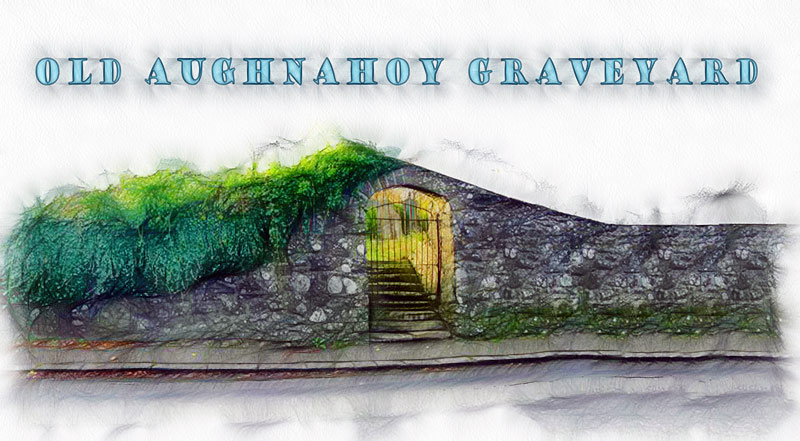Old Aughnahoy graveyard, which is just outside Portglenone, dates back to 1792, was the subject of a poem written by the Rev. Joseph Johnstone in December 1873. The writer of the poem was a native of the Portglenone area, and preached for some time in Newcastle-on-Tyne, England. The Reverend was the brother of James Johnstone, who lived on the Maboy Road near Portglenone.

Old Aughnahoy Graveyard, Portglenone
Poem – Old Aughnahoy Graveyard
A Mrs Clements, of Westland Drive in Belfast, who was the grand-daughter of the Rev. Joseph Johnstone (and also the Rev. James Knox) kept a copy of the poem. She forwarded it during the 1920s to R. M. Sibbett, who went on to include it in his excellent book, On the Shining Bann – Records of an Ulster Manor.
On Friday October 2nd 1925, E.S.J., a writer in the Ballymena Observer, referenced the poem. In an article called “To Portglenone People in General,” he says: “although many years have gone by since this poem was written, and the writer of it long since passed to his reward, the Aughnahoy burying-place, to all outward appearance, remains pretty nearly the same.
The present writer visited it one day last week, but not without feelings of deep regret, as nettles still abound and nature in many places seems to have run wild. Tall trees hang heavy, keeping out God’s beautiful sunshine, and in wet weather causes glit and leaves to darken many plots and monuments erected by kindly hands.
The writer desires to see the place one of the most beautiful laid out gardens (God’s acre) in all the wide expanse of Mr. Alexander’s beautiful demesne. (The latter gentleman is to be thanked for what he and his family have already done along this line); now it is high time that everyone interested in this place follows the fine example set them by Mr. Alexander, and try and keep the little family plots better looking by far than your flower gardens at home or lawns. Surely in this present up-to-date century in which we live it behoves us to remember those dear ones now missing from our ranks, many of whom, no doubt, adorned the homes in which they dwelt, as well as the Portglenone community in which they lived.
All honour to the person who plants a modest bunch of violets, or rears an humble cross to mark the sleeping place of their dear departed friends, if better cannot be afforded. Should this meet the eye of people who have so far neglected these hallowed grounds, it is hoped that such will take up their duty, as none of us know who may or may not neglect our own sleeping abodes.”
Old Aughahoy Graveyard
by Rev. Joseph Johnstone, 1873
by Rev. Joseph Johnstone, 1873
There a spot remote from strife.
Removed far from haunts of men,
It seems a place devoid life,
A quaint old curious looking glen—
A graveyard, fit abode
For travellers o’er life’s weary road.
Unlock its massive iron gate,
There enter and gaze around —
It seems, indeed, most desolate,
With weeds and nettles which abound,
Yet hundreds here in peace do meet,
And hold, perhaps, communion sweet.
Without the circuit of the wall
There stand the hoary oak and pine;
So thick that sunbeams scarce can fall
Upon the place they ought to shine.
How cool, how calm the heart might say
Upon that burning summer day.
Within the walls stands many a tomb,
So ancient that you scare could know
Who planted them in days of gloom,
To mark their friends who sleep below.
Great numbers since, the earth once trod
Now sleep beneath the verdant sod.
But pious hands have others raised
And deck’d them with peculiar care –
That friendship’s eye might often gaze
Upon such tombs both rich and fair.
And love to say: “These are set here
In memory of my friends most dear.”
One grave I seek, and find it here,
It’s form at once does meet my view,
While burning tears fast down do fall,
And all ancient griefs renew.
Here are the names I loved so well,
Far, far, more dear than tongue can tell.
How short to many is the space,
Since with sore hearts and sighs of pain
We bore to this last resting place
Our dear departed sister Jane.
A summer’s sun shone bright that day.
But sadness darkened all our light.
And, after her, one still more dear,
If dearer yet could ever be,
Our aged mother, all our joy,
We left behind in Aughnahoy;
And now they sleep that sleep profound,
Until the trump at last shall sound.
And now the hand of sore disease
Is laid upon this weary frame,
From night to morn I look for ease.
But look for lasting aid in vain –
My wish and prayer is just to be
Mother and sister, close to thee.
I long for death, as for a friend,
To join me to that happy band –
To sleep in peace, that knows no end,
Within this calm and silent land.
I’d count it bliss, without alloy.
When I shall rest in Aughnahoy.
– – – – – – –

I completely disagree with the author insomuch as I believe in its natural state this graveyard is much nicer than the overly tended bare ones, devoid of flowers & nature. There are forget me nots and bluebells … what could be nicer?
I’m with you, Christine. The graveyard looks far nicer in it’s natural state (as opposed to ones that are manicured and overly done).
I love the natural flowers. Indeed, I always loved the bluebells in the forest next door.